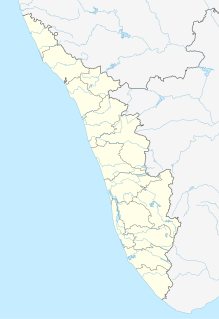
Chattampi Swamikal was a Hindu sage and social reformer. His thoughts and work influenced the launching of many social, religious, literary and political organisations and movements in Kerala and for the first time gave voice to those who were marginalised.

Thakazhi Sivasankara Pillai, popularly known as Thakazhi after his place of birth, was an Indian novelist and short story writer of Malayalam literature. He wrote over 30 novels and novellas and over 600 short stories focusing on the lives of the oppressed classes. Known for his works such as Kayar and Chemmeen, Pillai was a recipient of the Padma Bhushan, the third highest Indian civilian award. He was also a recipient of the Jnanpith, India's highest literary award, awarded in 1984 for the novel Kayar.
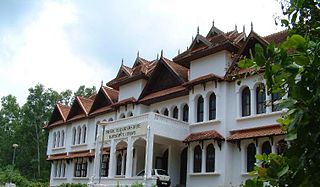
The Oriental Research Institute & Manuscripts Library, in the University of Kerala, is one of the leading centres of Indological Studies in India. This world recognised institute, situated in Thiruvananthapuram (Trivandrum), does research in fields connected with manuscripts. The department is microfilming the manuscripts of certain technical subjects.

Ulloor S. Parameswara Iyer, born Sambasivan but popularly known as Ulloor, was an Indian poet of Malayalam literature and a historian. He was one of the modern triumvirate poets of Kerala in the first half of the 20th century, along with Kumaran Asan and Vallathol Narayana Menon. Umakeralam, a mahakavya, and Kerala Sahitya Charithram, a comprehensive history of Malayalam language, are two of his works.

The importance and antiquity of education in Kerala is underscored by the state's ranking as among the most literate in the country. The educational transformation of Kerala was triggered by efforts of the Church Mission Society missionaries, who where the pioneers that promoted mass education in Kerala, in the early decades of the 19th century. The local dynastic precursors of modern-day Kerala - primarily the Travancore Royal Family, the Nair Service Society, Sree Narayana Dharma Paripalana Yogam and Muslim Educational Society (MES) - also made significant contributions to the progress on education in Kerala. There were many sabha mathams that imparted Vedic knowledge. Apart from kalaris, which taught martial arts, there were village schools run by Ezhuthachans or Asans. Christian missionaries brought the modern school education system to Kerala.
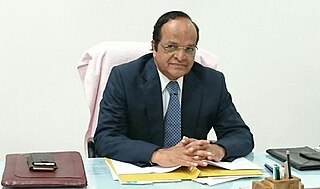
Prof. V. N. Rajasekharan Pillai is the Provost at Somaiya Vidyavihar. He was President of Mewar University, Chiittorgarh, Rajasthan, India (2016-2018). Concurrently he serves as the Honorary President of the Human Development Foundation India, a Civil Society Organisation in the National Capital Region, New Delhi. He was Executive Vice-President of the Kerala State Council for Science, Technology and Environment, Govt of Kerala during the period 2011–2014. Simultaneously he held positions as the Principal Secretary, Science & Technology Dept of the Govt of Kerala, Chairman of the Kerala Coastal Zone Management Authority and the Kerala Biotechnology Commission. Prior to that Prof. Pillai was the Vice-Chancellor of the Indira Gandhi National Open University (IGNOU), New Delhi (2006–2011) holding simultaneously the position of the Chairman, Distance Education Council, Govt of India. He served as Vice-Chairman & Chairman of the University Grants Commission, Govt of India, New Delhi during the period 2003–2006. He was the Executive Director of the National Assessment and Accreditaition Council (NAAC), Govt of India, during the period 2000–2003. Prior to that Prof. V. N. Rajasekharan Pillai was the Vice-Chancellor of the Mahatma Gandhi University, Kottayam, Govt of Kerala and held additional charge of the Cochin University of Science and Technology (1996–2000). In 2000 he was on a Visiting Research Professor assignment in the University of Lausanne, Switzerland. From 1983 to 1986, Dr. Pillai worked in various academic and research executive positions in the Mahatma Gandhi University, Kottayam such as the Founder Professor and Director of the School of Chemical Sciences, Dean of Faculty of Science, Founder Director of the School of Professional Distance Education, Director, College Development Council and Controller of Examinations of the University. During the period 1977–1983, Dr. Pillai worked as a Post-Doctoral Research Fellow, on deputation from Calicut University, Kerala, in the Universities of Tubigen and Mainz, Germany. From 1971 to 1983, he worked in the Universities of Kerala and Calicut University as UGC/CSIR Junor and Senior Research Fellow, Assistant Professor and Associate Professor in the area of Chemical Sciences. Professor Rajasekharan Pillai is an Elected Fellow of the Indian Academy of Sciences. Distinguished Fellow of the Kerala Academy of Sciences, and an Honorary Fellow of the Institution of Electronics and Telecommunication Engineers (IETE), New Delhi. He was also a Fellow of the Royal Society of Chemistry and an Honorary Senior Fellow of the Jawaharlal Nehru Centre for Advanced Scientific Research, Banaglaore.

G. Balakrishnan Nair (1929–2011) was an Indian academic, author and Sanskrit scholar. He worked extensively on the philosophical works of Narayana Guru.
Rev. Dr. C. T. Geevarghese Panicker was a priest and educationalist of Syro-Malankara Catholic Church.

Sooranad P. N. Kunjan Pillai was a historian, researcher, lexicographer, poet, essayist, literary critic, orator, socio-cultural leader, grammarian, educationist, and scholar of the Malayalam language. In 1984 he received the Padmashri award for his contribution to Malayalam literature and education.

Thirunalloor Karunakaran was a renowned poet, scholar, teacher and leftist intellectual of Kerala, India.
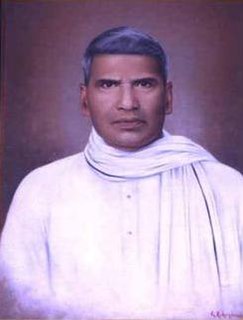
Elamkulam P. N. Kunjan Pillai, known as Elamkulam, was an Indian historian, linguist and academic from southern Kerala, India. He was a pioneering scholar of southern Indian history, Kerala history, in particular. Although only holding academic degrees in Sanskrit and Malayalam, and having no formal training as a historian, Elamkulam is considered one of the pioneers of modern Kerala historiography.
Vennikkulam Gopala Kurup (1902–1980) was an Indian poet, playwright, translator, lexicographer and story writer of Malayalam. He was the author of a number of poetry anthologies, besides other works, and he translated Abhijnana Shakuntalam, Tulsi Ramayana, Tirukkuṛaḷ, the poems of Subramania Bharati and two cantos of The Light of Asia of Edwin Arnold into Malayalam. He also contributed in the preparation of a dictionary, Kairali Kosham. A recipient of the Odakkuzhal Award and Thirukural Award, Kurup received the Kerala Sahitya Akademi Award for Poetry in 1966. Sahitya Akademi honoured him with their annual award in 1974.
K. Kunchunniraja was an Indian writer and scholar in Kerala. He was born in February 1920 in Nadathara in Thrissur district in Kerala. After his schooling at St. Thomas H.S. Thrissur he joined St. Thomas college there for higher studies. He had his further studies at Presidency College, Madras, Madras University and London School of Oriental Studies from where he took his M.A and two PhDs. He joined as lecturer at Govt. College, Chittoor, worked in various government colleges and then in 1951 joined Department of Sanskrit, Chennai University. After retirement worked as honorary director of Adayar library. He has also functioned as a member of Central Film Censor Board and in the advisory council of Kendra Sahitya Academy. He knew more than five languages including Prakrit and German. He has to his credit 30 books and more than 150 articles in Malayalam and English. He died in May 2005 at the age of 85.
Krishna Chaitanya was the pen name of Krishnapillai Krishnankutty Nair, known as K.K. Nair. He is an author of about 40 books on the subjects of art, literature, philosophy and education, and an art critic, musicologist and photographer.
Mahamahopadhyaya T. Gaṇapati Śāstrī (1860–1926) was a Sanskrit scholar who was editor of the Trivandrum Sanskrit Series, and discovered the plays of Bhasa. He was also the principal of the Sanskrit college for some time, around 1903. His father name is Ramasubba Iyer. He was born at Taruvai in Tirunelveli District in 1860 A.D

Alappat Sreedhara Menon, known as A. Sreedhara Menon, was a south Indian historian from Kerala. He is best known as the State Editor (1958-68) of Kerala District Gazetteers (1961-1975). He served as registrar of the Kerala University from 1968-1977, before retiring in 1980.

Plakkiyil Chacko Devassia, often known as Mahakavi P. C. Devassia, was a Sanskrit scholar and poet from Kerala, India. In 1980 he won the Sahitya Akademi Award for Sanskrit for his Mahakavyam Kristubhagavatam. He has also received the Kerala Sahitya Akademi Award for his overall contributions to Malayalam literature.
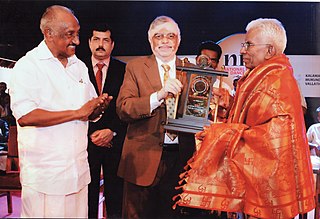
V. R. Prabodhachandran Nayar, popularly known as VRP Nayar, is a Phonetics expert of Kerala. He is the pioneer in the study of the phonology of the Malayalam language. Apart from phonology, he is also interested in syntax and stylistics.
Kurissery Gopala Pillai was an orientalist, researcher, lexicographer, poet, essayist, grammarian and scholar of Malayalam and Sanskrit languages. He specialised in Comparative study of languages.
Malayalam has seen the most number of Tirukkural translations than that of any other language in India. As of 2007, there are at least 21 translations of the Kural text available in Malayalam. Malayalam also has the distinction of producing the first ever translation of the Kural text among the languages in India and the world at large. The Annual Report of the Cochin Archeological Department for the year 1933–34 reported an unpublished manuscript of a Malayalam translation of the Tirukkural made in 1595.


